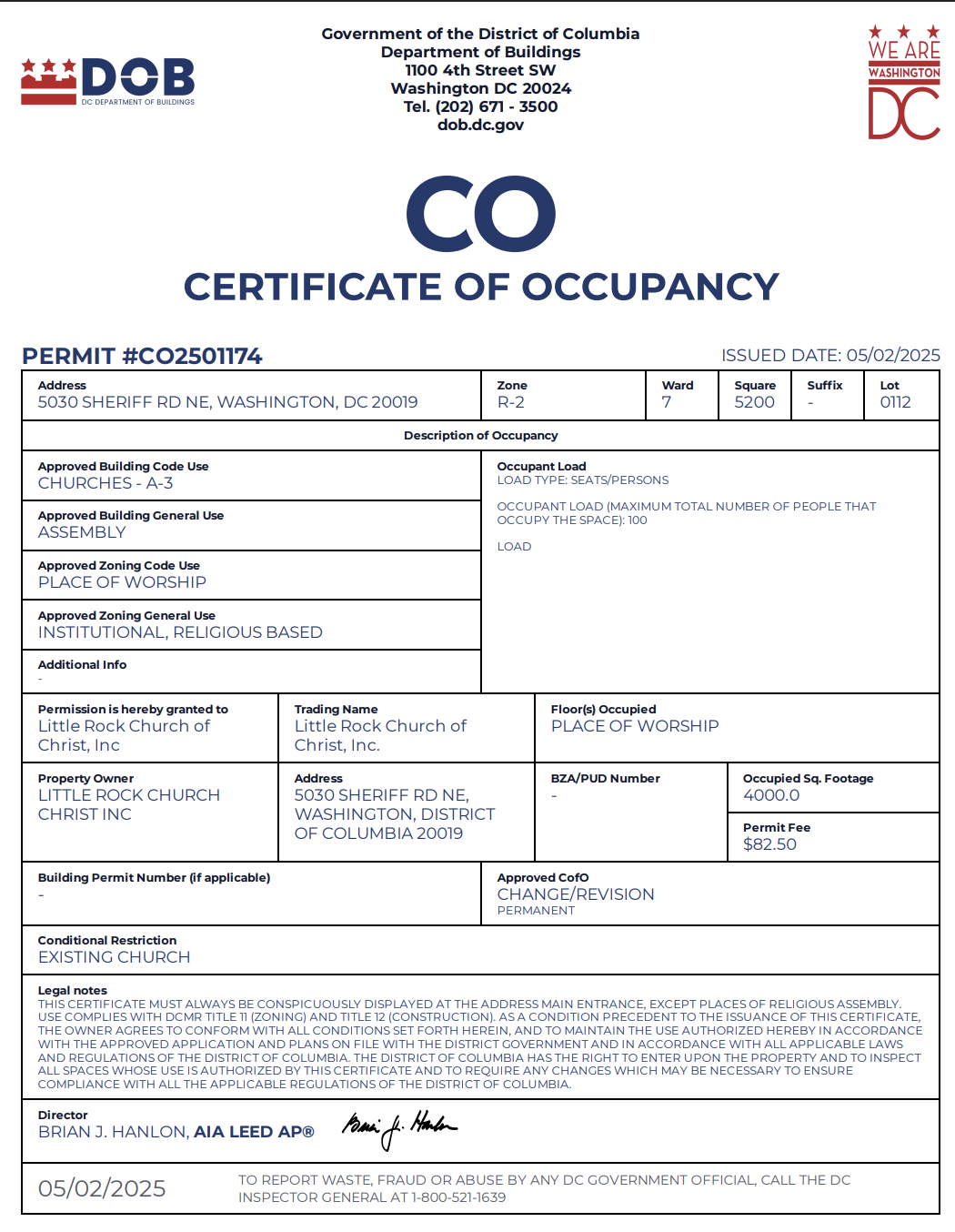Certificate of Occupancy for Single-Family Rental Properties in Washington, D.C.: A Complete Guide for Landlords
Operating a single-family rental property in Washington, D.C. requires more than just finding tenants and collecting rent. One of the most critical regulatory requirements is obtaining and maintaining a valid Certificate of Occupancy (C of O) from the Department of Consumer and Regulatory Affairs (DCRA). This comprehensive guide walks landlords and property managers through the entire process, ensuring compliance with District regulations while avoiding costly penalties.
Understanding the Certificate of Occupancy Requirement
A Certificate of Occupancy is a legal document issued by DCRA that certifies a residential property meets all applicable building codes, zoning requirements, and safety standards for its intended use. For single-family rental properties, this certificate serves as proof that the dwelling is safe and suitable for tenant occupancy.
In Washington, D.C., all rental properties must obtain a C of O before being offered for rent, regardless of whether the property was previously owner-occupied or has been used as a rental in the past. This requirement applies to single-family homes, townhouses, and other detached residential structures intended for rental use.
The certificate is property-specific and use-specific, meaning that converting an owner-occupied home to a rental property requires a new C of O, even if the property previously had one for owner occupancy.
When a Certificate of Occupancy is Required
New Rental Properties
Any single-family property being converted from owner-occupied to rental use must obtain a C of O before the first tenant moves in. This includes properties that have never been rented before and those returning to rental use after a period of owner occupancy.
Change of Ownership
When a rental property changes ownership, the new owner must obtain a new Certificate of Occupancy within 30 days of taking possession, regardless of whether the previous owner had a valid certificate.
Substantial Renovations
Properties undergoing major renovations that affect structural elements, electrical systems, plumbing, or HVAC systems require a new C of O upon completion of the work.
Expired Certificates
Certificates of Occupancy for rental properties must be renewed periodically. Properties with expired certificates cannot legally be rented until a new certificate is obtained.
Step-by-Step Application Process
Step 1: Pre-Application Property Assessment
Before beginning the formal application process, conduct a thorough assessment of your property to identify potential compliance issues. Review the property for:
Building Code Compliance: Ensure all structural, electrical, plumbing, and mechanical systems meet current codes
Zoning Compliance: Verify that single-family rental use is permitted in your property's zoning district
Safety Features: Confirm proper installation of smoke detectors, carbon monoxide detectors, and emergency egress windows
Accessibility Requirements: Check compliance with applicable ADA requirements
Step 2: Gather Required Documentation
Compile all necessary documents before submitting your application:
Property Deed or Title: Proof of ownership
Survey or Plot Plan: Showing property boundaries and structures
Floor Plans: Detailed drawings showing room layouts and dimensions
Previous Permits: Copies of any building permits for recent work
Utility Verification: Confirmation of active water, sewer, and electrical service
Certificate of Insurance: Property insurance documentation
Business License: Valid D.C. business license if operating as a business entity
Step 3: Complete the Application
Submit your C of O application through DCRA's online portal or in person at their offices. The application requires:
Property Information: Complete address, lot and square numbers, and zoning classification
Owner Information: Contact details and ownership documentation
Property Description: Number of rooms, bathrooms, and intended occupancy
Renovation History: Details of any recent modifications or improvements
Step 4: Pay Required Fees
Submit payment for all applicable fees at the time of application. Fee amounts vary based on property size and complexity but typically include:
Base Application Fee: $200-$400 for single-family properties
Inspection Fees: $150-$300 depending on property size
Processing Fees: Additional administrative charges may apply
Expedited Review Fee: Optional fee for faster processing (additional $500-$1,000)
Step 5: Schedule and Prepare for Inspection
Once your application is accepted, DCRA will schedule a comprehensive property inspection. Prepare for the inspection by:
Ensuring Property Access: All areas must be accessible to the inspector
Completing All Work: Any ongoing renovations must be finished
Testing Systems: Verify that all utilities and safety systems are operational
Cleaning the Property: Present the property in clean, move-in ready condition
Required Inspections and Standards
Building Code Inspection
The primary inspection focuses on structural integrity, electrical systems, plumbing, and HVAC compliance. Key areas of review include:
Structural Elements: Foundation, framing, and load-bearing components
Electrical Systems: Panel capacity, wiring condition, and GFCI protection
Plumbing Systems: Water supply, drainage, and fixture installation
Mechanical Systems: Heating, ventilation, and air conditioning adequacy
Safety and Life Protection Systems
Inspectors verify the installation and functionality of required safety equipment:
Smoke Detectors: Properly installed and interconnected units in required locations
Carbon Monoxide Detectors: Required near sleeping areas and fuel-burning appliances
Emergency Egress: Adequate windows or doors for emergency exit from bedrooms
Handrails and Guards: Proper installation on stairs and elevated surfaces
Zoning and Use Compliance
The inspection includes verification that the property's use as a single-family rental complies with zoning regulations:
Occupancy Limits: Ensuring the property doesn't exceed maximum occupancy for its zoning
Parking Requirements: Adequate off-street parking where required
Setback Compliance: Structures meet required distances from property lines
Accessory Use Restrictions: Compliance with limitations on secondary uses
Timeline and Processing Expectations
Standard Processing Timeline
The typical timeline for obtaining a Certificate of Occupancy includes:
Application Review: 5-10 business days for initial review and acceptance
Inspection Scheduling: 2-3 weeks from application acceptance to inspection date
Inspection Process: 2-4 hours for comprehensive property inspection
Certificate Issuance: 3-5 business days after successful inspection
Total Timeline: 4-6 weeks from application submission to certificate receipt
Expedited Processing Options
DCRA offers expedited processing for additional fees:
Fast Track Review: Reduces processing time by approximately 50%
Priority Inspection: Earlier inspection scheduling for urgent situations
Same-Day Certificate: Certificate issuance on the day of successful inspection
Factors Affecting Timeline
Several factors can extend the standard processing timeline:
Incomplete Applications: Missing documentation requires resubmission
Failed Inspections: Corrections and re-inspection add 2-4 weeks
Complex Properties: Larger or unusual properties may require additional review time
Peak Seasons: Higher application volumes during busy periods can cause delays
Fees and Financial Considerations
Standard Fee Structure
Current fees for single-family rental property Certificates of Occupancy include:
Application Fee: $275 for properties under 3,000 square feet
Inspection Fee: $200 for standard single-family properties
Certificate Fee: $75 for document preparation and issuance
Total Base Cost: Approximately $550 for straightforward applications
Additional Fees
Additional charges may apply in certain circumstances:
Re-inspection Fee: $150 for each additional inspection after initial failure
Plan Review Fee: $100-$300 for properties requiring detailed plan analysis
Expedited Processing: $500-$1,000 for accelerated review and inspection
After-Hours Inspection: $300 premium for inspections outside normal business hours
Payment Methods
DCRA accepts payment through multiple channels:
Online Payment: Credit cards and electronic checks through the DCRA portal
In-Person Payment: Cash, check, or credit card at DCRA offices
Mail Payment: Certified check or money order with application materials
Compliance Requirements and Ongoing Obligations
Certificate Validity and Renewal
Certificates of Occupancy for rental properties have specific validity periods and renewal requirements:
Initial Validity: New certificates are typically valid for 2-3 years
Renewal Process: Must be renewed before expiration to maintain legal rental status
Renewal Inspections: May require new inspections depending on property condition and changes
Ongoing Compliance Obligations
Maintaining a valid Certificate of Occupancy requires ongoing compliance with regulations:
Property Maintenance: Continued adherence to building and safety codes
System Updates: Keeping electrical, plumbing, and HVAC systems in good working order
Safety Equipment: Regular testing and maintenance of smoke and carbon monoxide detectors
Record Keeping: Maintaining documentation of repairs, improvements, and inspections
Reporting Requirements
Landlords must report certain changes to DCRA:
Ownership Changes: New owners must obtain updated certificates within 30 days
Major Renovations: Substantial improvements may require new certificates
Use Changes: Any modification to the property's rental use must be reported
Safety Incidents: Certain accidents or code violations must be disclosed
Penalties for Non-Compliance
Civil Penalties
Operating a rental property without a valid Certificate of Occupancy can result in significant financial penalties:
Initial Violation: $500-$1,000 fine for first offense
Continuing Violations: $100-$300 per day for ongoing non-compliance
Repeat Offenses: Escalating penalties for multiple violations
Maximum Penalties: Up to $10,000 for serious or persistent violations
Legal Consequences
Beyond financial penalties, non-compliance can result in:
Cease and Desist Orders: Legal prohibition on renting the property
Tenant Displacement: Required vacation of the property until compliance is achieved
Criminal Charges: Potential prosecution for willful violations
Civil Liability: Exposure to tenant lawsuits for unsafe conditions
Enforcement Actions
DCRA employs various enforcement mechanisms:
Routine Inspections: Periodic compliance checks of rental properties
Complaint Investigations: Response to tenant or neighbor complaints
Database Monitoring: Cross-referencing rental advertisements with permit records
Court Proceedings: Legal action for serious or persistent violations
Best Practices for Successful Applications
Preparation Strategies
Maximize your chances of approval by following these best practices:
Professional Consultation: Consider hiring experienced contractors or consultants for pre-inspection reviews
Documentation Organization: Maintain complete, organized records of all property improvements and permits
Proactive Maintenance: Address potential issues before they become compliance problems
Early Application: Begin the process well before you need to rent the property
Working with Inspectors
Foster positive relationships with DCRA inspectors:
Professional Courtesy: Treat inspectors with respect and professionalism
Preparation: Have the property clean, accessible, and ready for inspection
Documentation: Provide requested information promptly and completely
Follow-Up: Address any identified issues quickly and thoroughly
Common Mistakes to Avoid
Learn from others' experiences by avoiding these frequent errors:
Incomplete Applications: Ensure all required documentation is included
Premature Applications: Don't apply before all work is completely finished
Ignored Violations: Address all identified code violations promptly
Poor Communication: Maintain regular contact with DCRA throughout the process
Conclusion
Obtaining a Certificate of Occupancy for your single-family rental property in Washington, D.C. is a critical step in operating a legal and compliant rental business. While the process can seem complex, understanding the requirements, preparing thoroughly, and following proper procedures will help ensure successful completion.
The investment in obtaining proper certification protects both landlords and tenants by ensuring properties meet safety and habitability standards. Moreover, compliance with C of O requirements helps avoid costly penalties and legal complications that can significantly impact your rental property investment.
By following this comprehensive guide and maintaining ongoing compliance with District regulations, landlords can successfully navigate the Certificate of Occupancy process and operate their rental properties with confidence in their legal and regulatory standing.


